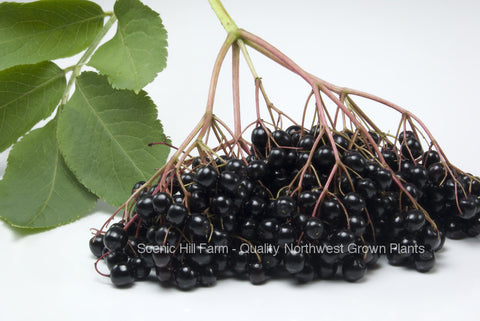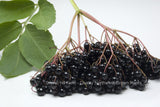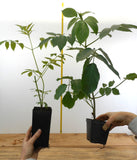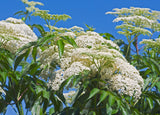Robust well rooted plants, ... Ships rooted in soil in separate pots. Plants are 2 year plants that are 20-30 inches tall, but may be pruned to 12 inches if they have grown too tall.
Elderberries have intensely flavored fruit with a rich aroma. .. are extremely hardy and are practically pest free. You should order two varieties for better pollination. The berries are recognized by the USDA Database for Flavonoid Content of Selected Foods' as a super fruit. Berries also have high concentrations of vitamin C. All parts of the plant contains toxic alkaloids. Berries should be cooked before eating which makes them safe to eat. Used in jams, preserves, pies, syrups and wine. Attracts birds and butterflies.
2 varieties are required to pollinate each other to insure abundant fruit...up to 30 pounds of berries for a mature plant. Grow to 6-14 foot tall, depending on variety. Likes full or 3/4 full sun. Please list the varieties you would like in Special Instructions for Seller when you order.
American Varieties
Ranch Elderberry is a very drought tolerant, productive, compact elderberry plant. Great for small or urban gardens. USDA zones 3-8. The best elderberry for non fertile soils and extreme climates.
Pocahontas Elderberry is a very large plant growing to 14 feet tall. Has large flowers and a very high yield of berries. It needs a long growing season to ripen berries. Makes a great hedge or specimen plant. USDA zones 4-9.
York Elderberries has large creamy white flowers and the largest berries of any elderberry. Sweet juicy, purple/black berries are great for jelly, juice, pie and wine. Will bear 2 years after planting. Grows in USDA zones 3 - 9. Colorful fall foliage. drought tolerant, productive, compact plant Great for small or urban garden.
Sold Out
Nova Elderberries are a hardy and very productive bush that bear large, sweet purple/black fruit that is good for jams, jellies, pie and wine. Ripens earlier than York. Grows in USDA zones 3 - 9. Sold Out
Bob Gordon Elderberry is a prolific berry producer, with berries that grow upright, reducing the risk of berry drop and making harvesting easier. Hardy in USDA zones 4 to 9. Has a higher sugar content and rich flavor.
Wyldewood is a robust Elderberry hybrid with large clusters of fragrant, white flowers that bloom in early summer, followed by heavy yields of dark purple-black berries. USDA zones 3 - 9. Sold Out
European Varieties
Haschberg is a Black European Elderberry (Sambucus nigra) popular for its abundant fruit production and robust growth. Adaptable to USDA zones 4 through 8.
Marge (Sambucus nigra) is a Black European Elderberry (Sambucus nigra), known for its ornamental and edible qualities. Will grow faster than other varieties. One of the highest yielding elderberry varieties. Hardy in USDA zones 5 to 8.
Free Shipping to most locations. We cannot ship to AK, HI, APO, US Territories, or areas considered remote without a freight surcharge.
If your temperature is warmer than 89 degrees or colder than 20 degrees, we will hold order until temperature improves. Please put your desired ship date in Special Instructions to Seller at checkout.
All plants are inspected for quality prior to shipment. Plants are rarely damaged in shipping, but if they are, please let us know right away so we can help. If there is any plant damage, take a photo of the package and plants. This will help us solve the problem.
9/25




